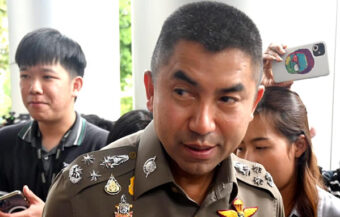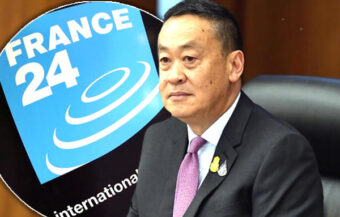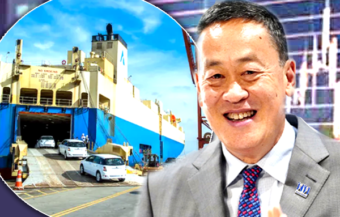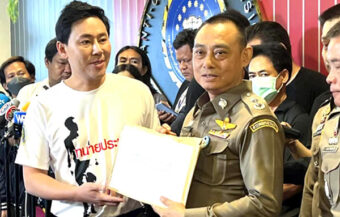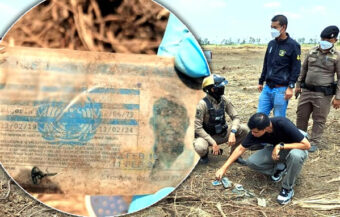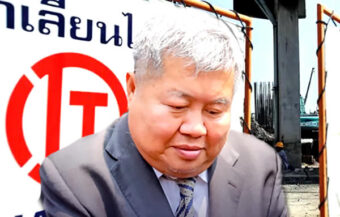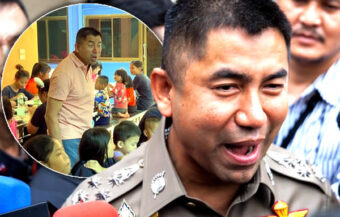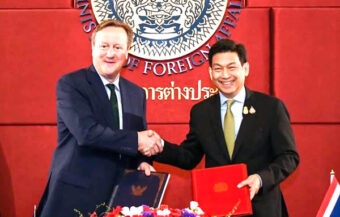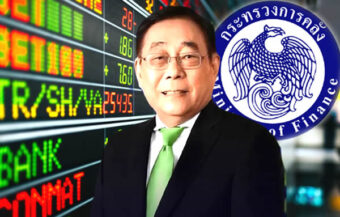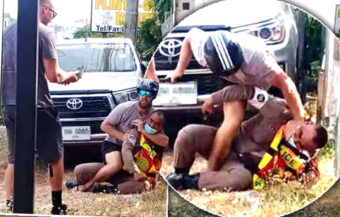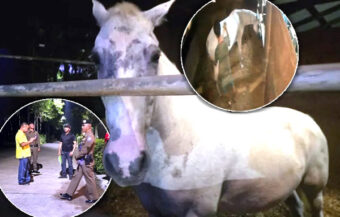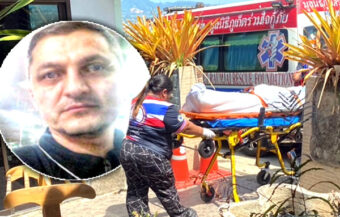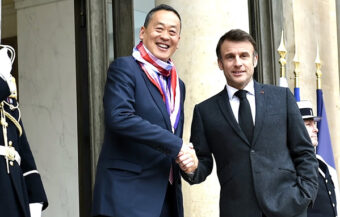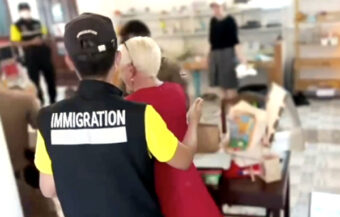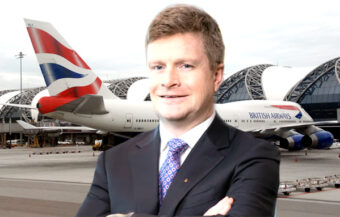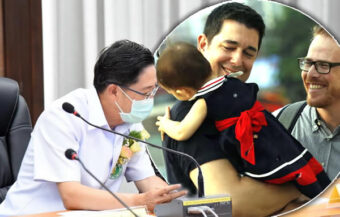In one week at the end of March, Thai police seized drugs worth over $175 million on the international market in two raids. The seizures are a reminder of the dynamic threat posed by narcotic drugs not just to people in Thailand but across the world. The seizures also highlight the impact of the drugs trade on regional stability.
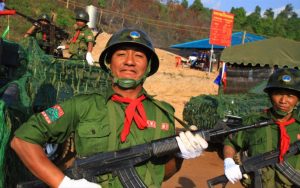
The week of anti narcotic operations by the Royal Thai police at the end of March threw a spotlight on the state within a state that is the United Wa territory within Myanmar. As world leaders congratulate Aung San Suu Kyi and Myanmar on its return to democracy and release of political prisoners, the reality and complexities of Myanmar’s problems is thrown into focus. The drugs trade on Thailand’s border is also a key challenge for Thai authorities.
Powerful army with its own mini state on the Thai border
One of the successful narcotics raids, by Thai police in Bangkok, foiled a drug smuggling operation attempting to transport drugs through Thailand and on to Taiwan via Bangkok port. Thai police confirmed that the gang involved had links to elements involved with Myanmar’s United Wa army.
The Wa army, a military organisation, is in fact officially labeled by the United States government as a narcotic trafficking oufit. The successful anti narcotics operation by the Thai police raises awkward questions about the ongoing activities of the Wa army. The United Wa army is officially the military wing of the United Wa State Party which governs territory in Myanmar. The Wa state was recognised by the Myanmar government as an autonomous authority in 2009. The Wa army, with a standing force of 16,000 men, and which can field up to 30,000 fighters, is thought to be a powerful military force.
Bangkok drugs bust linked to Myanmar’s United Wa army
The United Wa army controls an area in Myanmar adjacent to the Thai border and are reported to be active in drug trafficking throughout the region which has become known as the Golden Triangle. The raid and arrest by Thai police of three foreigners and a Thai national in Bangkok prior to and in the course of a raid on a ship on the Klong Toey docks in the early hours of April 1st are thought to be connected to a well know drug kingpin. Veera Muenja, associated with the United Wa army, has been on the run from authorities in Thailand for over 10 years.
Drug kingpin is son in law of Colonel in United Wa army
It is reported that Veera Muenja is, in fact, the son in law of the significant Wa army commander, Colonel Jolobo, who is himself the subject of a Thai arrest warrant issued in Lopburi province in 2007. Authorities in Thailand consider him among the top ten major drug traffickers in the country. The arrest of the drug trafficking gang was announced by Thailand’s Narcotic Suppression Bureau at a media briefing at the bureau on the 2nd April 2016. Thai police seized 48 kg of compressed heroin, thousands of ecstasy pills as well as a gun, rounds of ammunition and 4.9 million baht in cash. At the media briefing, Police Lieutenant General Rewat Klinkesorn, the Commander of the National Suppression Bureau revealed that police had found the heroin contained in two computer cases when they intercepted the gang.
Tipp off from Taiwanese police led to anti narcotic operation
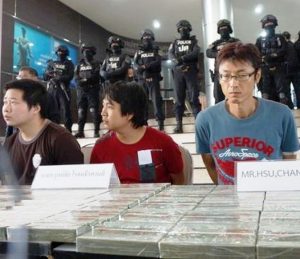
Law enforcement officials in Taiwan had tipped off their counterparts in Thailand. They alerted them to the activities of two Taiwanese members of a drug network who were thought to be in Thailand. It is reported that the gang used the cover of being tourists from Taiwan in their failed effort to smuggle drugs from Bangkok. Following the tip off, Thai police dispatched officers to the Silom area in Bangkok. The police also covered the Charoen Krung and Chan roads in order to track down the gang. These are areas frequented by Taiwanese tourists.
Thai police followed suspects who purchases CPU case
On Thursday the 31st March, the Thai police identified Mr. Hsu Chang-Hung, a Chinese national. He was identified as being in possession of illegal narcotics at a mansion or apartment complex in the Bang Klum district of Bangkok. The police trailed Mr Hsu and observed that he purchased two computer CPU casings from a shop before returning to his room at the mansion. Mr Hsu and a Mr Narutchai Rojanatheerasan, a 27 year old Thai national from Chiang Mai were seen emerging from the room with the two computer cases. They later put them in a car before driving to the port area in Klong Toey. Klong Toey is a dockland area in Bangkok which is notorious for illegal activities particularly drug running.
Cargo ship moored at Klong Toey port identified by police
That evening, Thai police observed the duo handing over the computer cases to two Chinese nationals, a Mr Bai Ya Peng and Mr Rao Xiao Hu. Both were on board a cargo ship moored at the port. At 3am the following morning, Friday the 1st April, Thai Narcotic suppression officers and customs officials raided the ship and made arrests. Police later searched rooms used by the gang at Sathorn and Kho Laem in Bangkok where more heroin and ecstacy pills were seized. The National Suppression Bureau Commissioner Police Lieutenant General Klinkesorn told the media on the 2nd April that the four suspects had confessed. They had taken part in smuggling drugs to Taiwan on three occasions using caro ships from Thailand. The four men were held in police custody on drugs charges including possessing illegal drugs with the intention to sell. Thai police confirmed that the gang are members of an extensive network linked to Veera Muenja who represents the Wa army commander, Colonel Jolobo. Colonel Jolobo is understood to be Deputy Commander of a division of the United Wa army.
Narcotic drugs a key threat to Thailand
The successful police operation, followed another earlier spectacular seizure of drugs including heroin, methamphetamines and crystal meth from a large group of Malaysians. This gang were attempting to smuggle drugs by rail into Malaysia one week earlier, on March 24th 2016. It is estimated by some commentators that the value of the drugs seized by Thai police in both operations may have had a street value in foreign countries in excess of $175 million or 6 billion baht. Not only do the seizures indicate the vibrancy of the drugs trade but also remind us of the instabilities that still exists within the Southeast Asian region. Thailand’s military has long claimed that the drug cartels and their operations are the single biggest security threat to Thailand and its people. In 2012, the Thai government called on other leaders of the Asean block of country to work together to eliminate the blight of narcotics in the region.
Background to the United Wa army in Myanmar
The United Wa army is a powerful military force occupying strategic positions within Myanmar’s or Burma’s Shan state adjacent to the Thai and Chinese borders. The Wa are an ethnic hill tribe population. Up until a ceasefire and recognition pact with the Burmese government, the group was implacably opposed to lowland Burma and the Burmese authorities.
The Wa army is the official army of an autonomous self governing territory known as the United Wa state. The Wa state has extensive links and backing from China. It even uses the Chinese international dialing code. The United Wa army has a military strength of 16,000 well trained soldiers with a further 14,000 reservists. It is reported that it purchases weaponry from China. The United Wa state is also involved in economic projects within its own region and it is thought that significant funding for such initiatives, as well as for its weaponry comes from the narcotic drugs trade.
There is, however, a stated policy calling for the elimination narcotic production within the Wa state but some doubt as to how effective the policy has been. The origins of the state is traced back to the now defunct Communist Party of Burma which was originally supported by the Chinese government.



